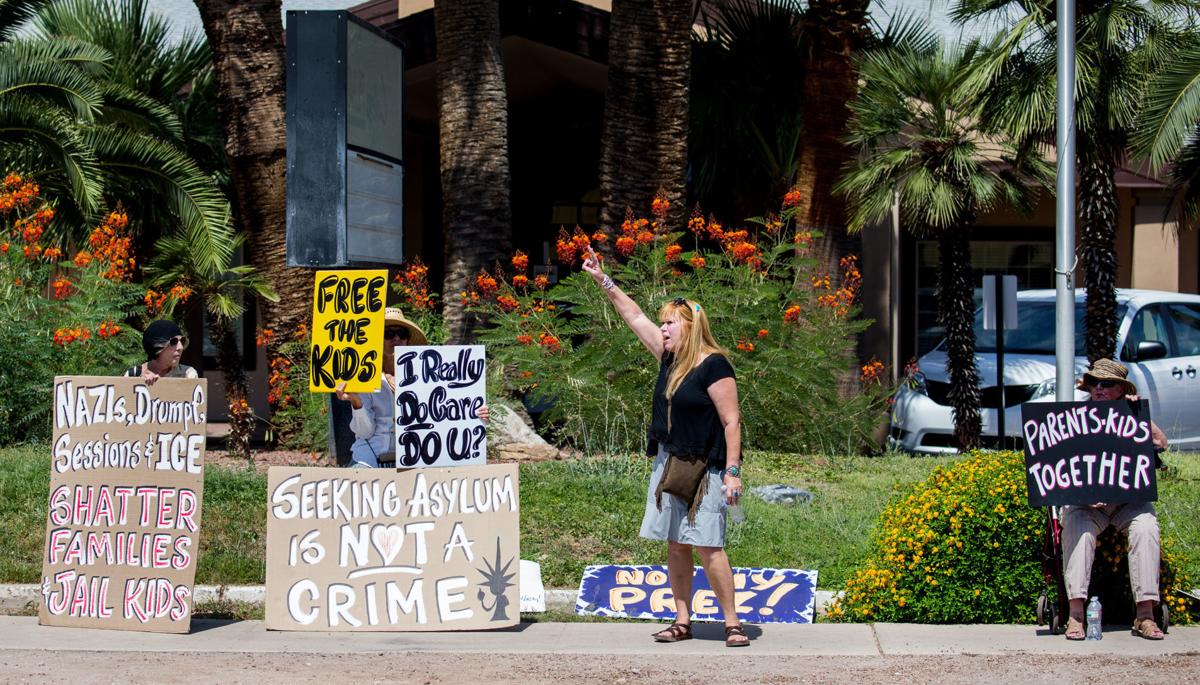Nearly a month after it set out to find answers, Tucson’s largest school district doesn’t know when or if it will be able to take over the education of hundreds of detained migrant children being housed in a midtown immigration facility.
The Tucson Unified School District Governing Board last month asked Superintendent Gabriel Trujillo to figure out what rights and responsibility TUSD has to take over education of the estimated 300 migrant children being held at the facility on Oracle Road north of Speedway, within district boundaries.
Trujillo told the TUSD Governing Board Tuesday that he met with officials from Southwest Key, the nonprofit operating the shelter, and that the representatives were “incredibly collaborative, if not excited, at the possibility of potentially working with us.”
But he said he had not secured a definite timeline from Southwest Key about possibly entering into an agreement to let the school district educate the children held at its facility. That decision would be up to the nonprofit company’s board of directors.
And he said questions remain about whether the district has standing to force the shelter to allow TUSD to educate the children — mainly centered around whether the children are considered “homeless.” If so, federal law states that the local school district must serve the children. But whether the migrants qualify as homeless hasn’t been determined yet, he said, noting it will be up to the U.S. Department of Education to decide and TUSD hasn’t officially asked yet.
The homeless question aside, the district said it has discussed two possible scenarios with Southwest Key.
The first is that Southwest Key would work with the U.S. Office of Refugee Resettlement to see if it can deem TUSD the sole educational service provider for students. That would allow TUSD to collect money from the state to educate the children. But that option is complicated by the fact that Southwest Key is being paid by the federal government to educate the children, and it’s unclear whether it can keep that contract while TUSD is also being paid by the state on a per-pupil basis to educate the children.
If TUSD isn’t deemed the sole education provider, there’s still another option.
The second scenario is that the district would rent space to Southwest Key at one of its closed schools, either at the former Howenstine High or Wakefield Middle schools, and would provide the educators at Southwest Key with professional development, primarily in the area of language acquisition. Southwest key would have to pay fair market value for the space, professional development services and transportation, and would have to pay out of pocket to get either facility cleaned up and ready.
Whether Southwest Key takes advantage of either option will be up to its national board of directors, which has yet to discuss the issue.
Trujillo, who noted dealing with the federal government is a slow process, hopes to have an update in September.
It’s unclear what kind of education the students are receiving under the care of Southwest Key, a nonprofit that contracts with the federal government to house the young detainees.
The organization does not operate a charter school, and state Department of Education records show Estrella Del Norte, the Tucson facility run by Southwest Key, is listed as a “residential child care institution,” not a school.
The Arizona Department of Education has not been granted a tour of the facilities, nor have reporters and the public.
The few state lawmakers who have been inside say it’s unclear whether the facility is following state and federal education laws and teaching to Arizona standards or merely engaged in long-term baby-sitting.
Trujillo recently received a partial tour of the facility, and said while it didn’t appear students were being mistreated, he didn’t get to observe teachers and students in action, which he would need to see to make a solid determination about the quality of education.
But from seeing the classrooms, Trujillo, a former English as a Second Language teacher, said it was clear Southwest Key doesn’t have the infrastructure to teach these migrant students that TUSD does.
“From an old ESL teacher’s perspective, I didn’t see that the classrooms were 100 percent equipped for high-quality second language instruction,” he said. “(That kind of class) usually features large spaces for collaborative learning. It usually features digital technology inside the classroom. You have a lot of manipulative (tools), you have a lot of flash cards to teach vocabulary, big pictorial flash cards. You have picture books and bilingual resources. I didn’t see a lot of that present in those classes.”





